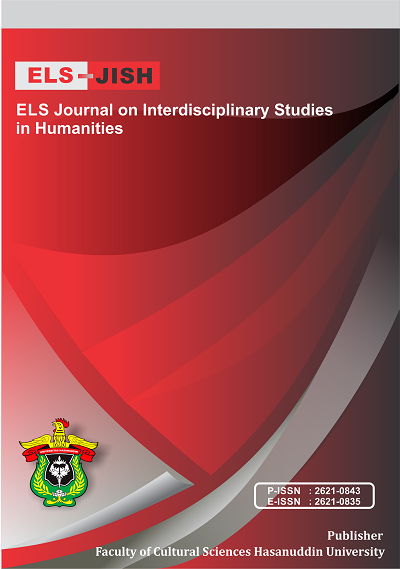Students' English Learning Strategies in Dealing with Merdeka Belajar Kampus Merdeka (MBKM) Curriculum in Indonesia: Perceptions and Factors
DOI:
https://doi.org/10.34050/elsjish.v6i2.27254Keywords:
Curriculum, learning strategies, MBKM, Students’ perceptionAbstract
This paper finds the students’ perception students English learning strategies in dealing with Merdeka Belajar Kampus Merdeka (MBKM) curriculum in Indonesia with the research questions: (1) How do students perceive English learning strategies in the current MBKM curriculum change? and (2) What are the supporting factors faced by students in learning English in the current MBKM curriculum change? This study was conducted among all students of the English Education Study Program, Universitas Negeri Makassar, Indonesia in the second, fourth and sixth semesters. From the number of even semester students for the 2021/2022 academic year, which amounted to approximately 500 students, 122 students sent back the results of questions given online. The data obtained from the questionnaire about the student’s perception of the implementation of English learning strategies in the current curriculum change were scored by using the Likert scale. The scoring system was done positively and negatively. The data was analyzed by using percentages. It aimed to measure the respondents’ opinions. Then, to interpret the students’ interest responses, the researchers used the interval estimate. The interval estimation was used to measure the parameter of population based on the score of rates interval sample data and ranged to 5 categories level. The result found that students had a positive perception of English learning strategies in the current curriculum change. This is evidenced by the average student perception score of 68.48 which means it is in a positive category according to the range of perception scores. Therefore, students have a positive attitude to deal with curriculum changes in every era. There were no students who stated very negative statements about the use of learning strategies in the era of curriculum change, there was only 1 student (0.82%) who was very positive. 23 students were hesitant to get a score in the 50-64 interval, and 98 students (80.33%) were in the positive category in the 65-80 interval. Many factors influence students' English learning strategies before and during the Covid-19 Pandemic era. The factors come from students, lecturers, school, environment, learning process and materials conditions.
References
Aji, W. N., & Budiyono, S. (2018). The teaching strategy of Bahasa Indonesia in curriculum 2013. International Journal of Active Learning, 3(2), 58-64.
Bogdan, R., & Biklen, S. K. (1997). Qualitative research for education. Boston, MA: Allyn & Bacon.
Bradford, A. (2007). Motivational orientations in under-researched FLL contexts: Findings from Indonesia. Relc Journal, 38(3), 302-323.
Burns, A. (2009). Action research in second language teacher education. The Cambridge guide to second language teacher education, 289-297.
Denzin, N. K. (2012). Triangulation 2.0. Journal of mixed methods research, 6(2), 80-88.
Junaidi, J., Budianto Hamuddin, B., Wendy, S., Fathu, R., & Tatum, D. (2020). ICT usage in teaching English in Pekanbaru: Exploring junior high school teachers’ problems. International Journal of Advanced Science and Technology, 29(03), 5052-5063.
Kassing, R. B. (2011). Perceptions of motivational teaching strategies in an EFL classroom: The case of a class in a private university in Indonesia. A thesis submitted to the Victoria University of Wellington in partial fulfillment of the requirements for the degree of Master of Education.
Kirkpatrick, A. (2007). Teaching English across cultures: what do English language teachers need to know to know how to teach English. EA journal, 23(2), 20-36.
Oxford, R., & Shearin, J. (1994). Language learning motivation: Expanding the theoretical framework. The modern language journal, 78(1), 12-28.
Pawlak, M. (2018). Investigating the use of speaking strategies in the performance of two communicative tasks: The importance of communicative goal. Studies in Second Language Learning and Teaching, 8(2), 269-291.
O’Malley, J. Michael, & Chamot, (1990). Learning Strategies in Second Language Acquisition. Cambridge: Cambridge University Press.
Rahman, F., & Weda, S. (2018). Students’ perceptions in appreciating English literary works through critical comment: A case study at Hasanuddin University and Universitas Negeri Makassar. Asian EFL Journal, 20(3), 149-172.
Rao, P. S. (2019). The importance of speaking skills in English classrooms. Alford Council of International English & Literature Journal (ACIELJ), 2(2), 6-18.
Sakkir, G., Rahman, Q., & Salija, K. (2016). Students' Perception on Social Media in Writing Class at STKIP Muhammadiyah Rappang, Indonesia. International Journal Of English Linguistics, 6(3), 170-175.
Sawir, E. (2005). Language difficulties of international students in Australia: The effects of prior learning experience. International education journal, 6(5), 567-580.
Stainback, S., & Stainback, W. (1988). Understanding & Conducting Qualitative Research. Council for Exceptional Children, Publication Sales, 1920 Association Dr., Reston, VA.
Halim, S., Wahid, R. A., & Halim, T. (2018). Classroom observation-A powerful tool for continuous professional development (Cpd). International Journal on Language, Research and Education Studies, 2(2), 162-168.
Hmelo-Silver, C. E. (2004). Problem-based learning: What and how do students learn?. Educational psychology review, 16, 235-266.
Lie, A. (2007). Education policy and EFL curriculum in Indonesia: Between the commitment to competence and the quest for higher test scores. TEFLIN journal, 18(1), 01-15.
Setiyadi, A. B. (2001). Language learning strategies: Classification and pedagogical implication. TEFLIN Journal, 12(1), 15-28.
Sudjana, M.A. 1996. Metode Statistika. Penerbit Tarsito. Bandung
Sulistiyo, U. (2016). English language teaching and EFL teacher competence in Indonesia. Proceedings of ISELT FBS Universitas Negeri Padang, 4(2), 396-406.
Sugirin. (1999). Exploring the comprehension strategies of EFL readers: A multi-method study. Paper presented at an International Workshop on Written Language Processing at the University of New South Wales, Sydney, Dec. 9, 1998. (ERIC Document Reproduction Service No. ED 428 548)
Suryati, N., Chen, S., & Archer, J. (2013). Students’ perceptions of EFL classroom interaction: An Indonesian study. International Journal of Literacies, 19(3), 181-199.
Wright, T. (2010). Second language teacher education: Review of recent research on practice. Language teaching, 43(3), 259-296.
Yulia, Y. (2013). Teaching challenges in Indonesia: Motivating students and teachers’ classroom language. Indonesian Journal of Applied Linguistics, 3(1), 1-16.
Downloads
Published
How to Cite
Issue
Section
License
Copyright (c) 2023 Sukardi Weda, Geminastiti Sakkir, Andi Elsa Fadhilah Sakti

This work is licensed under a Creative Commons Attribution-ShareAlike 4.0 International License.






